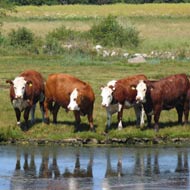Study sheds light on Salmonella threat

The research team wanted to find out whether some strains are better at surviving in cattle than others, as these would pose a greater threat to human health.
New research suggests that all Salmonella strains found in tested cattle had a similar zoonotic potential and could compromise food safety.
Scientists at the University of Edinburgh developed a new sequencing method to simultaneously study the survival of different strains in cattle.
Salmonella can infect both cattle and humans. There are more than 2,600 serovars, many of which can survive in the lymphatic system of cattle. Contaminated peripheral lymph nodes can enter the food chain via ground beef products and if these are not properly cooked, humans can suffer Salmonella infections.
The research team wanted to find out whether some strains are better at surviving in cattle than others, as these would pose a greater threat to human health. This will help scientists to develop suitable vaccines and interventions to prevent Salmonella being transmitted to humans.
A novel whole-genome sequencing approach was used to identify and quantify the serovars present in a mixed population. All serovars were present in the peripheral lymph nodes, suggesting they have similar zoonotic potential and can all compromise food safety.
Scientists say the method could be applied to other bacteria with naturally variable genes. It could also be used to test the efficacy of vaccines and control strategies against pathogens, as well as for the routine surveillance of farms, food products and the environment.
The results have been published in the journal Applied and Environmental Microbiology.



 The Veterinary Medicines Directorate (VMD) is inviting applications from veterinary students to attend a one-week extramural studies (EMS) placement in July 2026.
The Veterinary Medicines Directorate (VMD) is inviting applications from veterinary students to attend a one-week extramural studies (EMS) placement in July 2026.